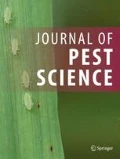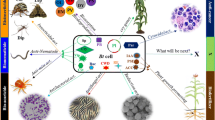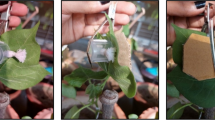Abstract
The virulence factors (VF) that parasitoids use to regulate the growth and development of their hosts have potential as new events in transgenic plants. VFs are promising candidates for biotechnological exploitation and implementation of pest-control tools to meet the world’s demand for food in 2100, while sustainably increasing agricultural production. However, VFs have not been used in commercial transgenic plants, since they are thought to target only a narrow range of insects, due to the parasitoid host specialization. We investigated the potential of chitolectin (TnChit), produced by the teratocytes of Toxoneuron nigriceps (Viereck) (Hymenoptera: Braconidae), as a transgenic event to control several non-permissive hosts: Chrysodeixis includens (Walker), Spodoptera albula (Walker), Spodoptera frugiperda (JE Smith) (Lepidoptera: Noctuidae), Tuta absoluta (Meyrick) (Lepidoptera: Gelechiidae) and Bemisia tabaci (Gennadius) (Hemiptera: Aleyrodidae). Third instars of C. includens, S. albula and S. frugiperda had lower survival and probability of molting on TnChit-modified plants than on control plants. The nutritional indices of S. frugiperda were also altered. Larval survival and pupal weight of males of T. absoluta were reduced on transgenic plants. Adult emergence of B. tabaci was also reduced. The expression of the TnChit gene differed in the transformation events obtained and was consistent with the biological effects observed. The effects of TnChit on non-permissive hosts demonstrate the potential of the virulence factors that parasitoids employ in host regulation, as a source of new genes in plant transformation for control of insect pests.






Similar content being viewed by others
References
Ali MR, Lim J, Kim Y (2015) Transcriptome of a specialized extra-embryonic cell, teratocyte, and its host immunosuppressive role revealed by ex vivo RNA interference. Insect Mol Biol 24:13–28. https://doi.org/10.1111/imb.12132
Beckage NE, Gelman DB (2004) Wasp parasitoid disruption of host development: implications for new biologically based strategies for insect control. Annu Rev Entomol 49:299–330. https://doi.org/10.1146/annurev.ento.49.061802.123324
Bernardi D, Salmeron E, Horikoshi RJ, Bernardi O, Dourado PM, Carvalho RA, Martinelli S, Head GP, Omoto C (2015) Cross-resistance between Cry1 proteins in fall armyworm (Spodoptera frugiperda) may affect the durability of current pyramided bt maize hybrids in Brazil. PLoS ONE 10:1–15. https://doi.org/10.1371/journal.pone.0140130
Bitra K, Burke GR, Strand MR (2016) Permissiveness of lepidopteran hosts is linked to differential expression of bracovirus genes. Virology 492:259–272. https://doi.org/10.1016/j.virol.2016.02.023
Bitra K, Suderman RJ, Strand MR (2012) Polydnavirus Ank proteins bind NF-κB homodimers and inhibit processing of Relish. PLoS Pathog 8. https://doi.org/10.1371/journal.ppat.1002722
Blanco CA, Chiaravalle W, Dalla-Rizza M, Farias JR, García-Degano MF, Gastaminza G, Mota-Sánchez D, Murúa MG, Omoto C, Pieralisi BK, Rodríguez J, Rodríguez-Maciel JC, Terán-Santofimio H, Terán-Vargas AP, Valencia SJ, Willink E (2016) Current situation of pests targeted by Bt crops in Latin America. Curr Opin Insect Sci 15:131–138. https://doi.org/10.1016/j.cois.2016.04.012
Butt BA, Cantu E (1962) Sex determination of Lepidopterous Pupae. U.S, Department of Agriculture, Agricultural Research Service
Chakroun M, Banyuls N, Bel Y, Escriche B, Ferré J (2016) Bacterial vegetative insecticidal proteins (Vip) from entomopathogenic bacteria. Microbiol Mol Biol Rev 80:329–350. https://doi.org/10.1128/MMBR.00060-15
Chen W, Hasegawa DK, Kaur N, Kliot A, Pinheiro PV, Luan J, Stensmyr MC, Zheng Y, Liu W, Sun H, Xu Y, Luo Y, Kruse A, Yang X, Kontsedalov S, Lebedev G, Fisher TW, Nelson DR, Hunter WB, Brown JK, Jander G, Cilia M, Douglas AE, Ghanim M, Simmons AM, Wintermantel WM, Ling K-S, Fei Z (2016) The draft genome of whitefly Bemisia tabaci MEAM1, a global crop pest, provides novel insights into virus transmission, host adaptation, and insecticide resistance. BMC Biol 14:110. https://doi.org/10.1186/s12915-016-0321-y
Chen XD, Seo M, Stelinski LL (2017) Behavioral and hormetic effects of the butenolide insecticide, flupyradifurone, on Asian citrus psyllid, Diaphorina citri. Crop Prot 98:102–107. https://doi.org/10.1016/j.cropro.2017.03.017
Cônsoli FL, Brandt SL, Coudron TA, Vinson SB (2005) Host regulation and release of parasitism-specific proteins in the system Toxoneuron nigriceps-Heliothis virescens. Comp Biochem Physiol B Biochem Mol Biol 142:181–191. https://doi.org/10.1016/j.cbpc.2005.07.002
Cônsoli FL, Lewis D, Keeley L, Vinson SB (2007) Characterization of a cDNA encoding a putative chitinase from teratocytes of the endoparasitoid Toxoneuron nigriceps. Entomol Exp Appl 122:271–278. https://doi.org/10.1111/j.1570-7458.2006.00514.x
de Siqueira PM, Abeyratne CR, Benedito VA, Peres LEP (2017) Genetic and physiological characterization of three natural allelic variations affecting the organogenic capacity in tomato (Solanum lycopersicum cv. Micro-Tom). Plant Cell, Tissue Organ Cult 129:89–103
Di Lelio I, Caccia S, Coppola M, Buonanno M, Di Prisco G, Varricchio P, Franzetti E, Corrado G, Monti SM, Rao R, Casartelli M, Pennacchio F (2014) A virulence factor encoded by a polydnavirus confers tolerance to transgenic tobacco plants against lepidopteran larvae, by impairing nutrient absorption. PLoS One 9:1–21. https://doi.org/10.1371/journal.pone.0113988
Ding X, Gopalakrishnan B, Johnson LB, White FF, Wang X, Morgan TD, Kramer KJ, Muthukrishnan S (1998) Insect resistance of transgenic tobacco expressing an insect chitinase gene. Transgenic Res 7:77–84. https://doi.org/10.1023/A:1008820507262
Dorémus T, Cousserans F, Gyapay G, Jouan V, Milano P, Wajnberg E, Darboux I, Cônsoli FL, Volkoff AN (2014) Extensive transcription analysis of the Hyposoter didymator ichnovirus genome in permissive and non-permissive lepidopteran host species. PLoS ONE 9. https://doi.org/10.1371/journal.pone.0104072
Doucet D, Cusson M (1996) Alteration of developmental rate and growth of Choristoneura fumiferana parasitized by Tranosema rostrale: role of the calyx fluid. Entomol Exp Appl 81:21–30
Douglas AE (2018) Strategies for enhanced crop resistance to insect pests. Annu Rev Plant Biol 69:1–24. https://doi.org/10.1146/annurev-arplant-042817040248
Early R, González-Moreno P, Murphy ST, Day R (2018) Forecasting the global extent of invasion of the cereal pest Spodoptera frugiperda, the fall armyworm. NeoBiota 40:25–50. https://doi.org/10.3897/neobiota.40.28165
Falabella P, Riviello L, Caccialupi P, Rossodivita T, Teresa Valente M, Luisa De Stradis M, Tranfaglia A, Varricchio P, Gigliotti S, Graziani F, Malva C, Pennacchio F (2007) A gamma-glutamyl transpeptidase of Aphidius ervi venom induces apoptosis in the ovaries of host aphids. Insect Biochem Mol Biol 37:453–465. https://doi.org/10.1016/j.ibmb.2007.02.005
Fath-Goodin A, Gill TA, Martin SB, Webb BA (2006a) Effect of Campoletis sonorensis ichnovirus cys-motif proteins on Heliothis virescens larval development. J Insect Physiol 52:576–585. https://doi.org/10.1016/j.jinsphys.2006.02.005
Fath‐Goodin A, Kroemer J, Martin S, Reeves K, Webb BABT-A in VR (2006) Polydnavirus genes that enhance the baculovirus expression vector system. In: Insect viruses: biotechnological applications. Academic Press, New York, pp 75–90
Fathipour Y, Sedaratian A, Bagheri A, Talaei-Hassanlouei R (2019) Increased food utilization indices and decreased proteolytic activity in Helicoverpa armigera larvae fed sublethal Bacillus thuringiensis-treated diet. Physiol Entomol. https://doi.org/10.1111/phen.12288
Führer E, Willers D (1986) The anal secretion of the endoparasitic larva Pimpla turionellae: sites of production and effects. J Insect Physiol 32:361–367. https://doi.org/10.1016/0022-1910(86)90049-1
Fulton TM, Chunwongse J, Tanksley SD (1995) Microprep protocol for extraction of DNA from tomato and other herbaceous plants. Plant Mol Biol Report 13:207–209. https://doi.org/10.1007/BF02670897
Gill TA, Fath-Goodin A, Maiti II, Webb BA (2006) Potential uses of cys-motif and other polydnavirus genes in biotechnology. Adv Virus Res 68:393–426. https://doi.org/10.1016/S0065-3527(06)68011-1
Godfray HCJ (1994) Parasitoids : behavioral and evolutionary ecology. Princeton University Press, New Jersey
Grover S, Jindal V, Banta G, Taning CNT, Smagghe G, Christiaens O (2019) Potential of RNA interference in the study and management of the whitefly. Bemisia tabaci Arch Insect Biochem Physiol 100:e21522. https://doi.org/10.1002/arch.21522
Guedes RNC, Cutler GC (2014) Insecticide-induced hormesis and arthropod pest management. Pest Manag Sci 70:690–697. https://doi.org/10.1002/ps.3669
Gueguen G, Kalamarz ME, Ramroop J, Uribe J, Govind S (2013) Polydnaviral ankyrin proteins aid parasitic wasp survival by coordinate and selective inhibition of hematopoietic and immune NF-kappa β signaling in insect hosts. PLoS Pathog 9. https://doi.org/10.1371/journal.ppat.1003580
Gundersen-Rindal D, Dupuy C, Huguet E, Drezen JM (2013) Parasitoid polydnaviruses: evolution, pathology and applications: dedicated to the memory of Nancy E. Beckage Biocontrol Sci Technol 23:1–61. https://doi.org/10.1080/09583157.2012.731497
Han P, Wang Z, Lavoir A-V, Michel T, Seassau A, Zheng W, Niu C, Desneux N (2016) Increased water salinity applied to tomato plants accelerates the development of the leaf miner Tuta absoluta through bottom-up effects. Sci Rep 6:32403
Inbar M, Gerling D (2008) Plant-mediated interactions between whiteflies, herbivores, and natural enemies. Annu Rev Entomol 53:431–448. https://doi.org/10.1146/annurev.ento.53.032107.122456
Janmaat AF, Bergmann L, Ericsson J (2014) Effect of low levels of Bacillus thuringiensis exposure on the growth, food consumption and digestion efficiencies of Trichoplusia niresistant and susceptible to Bt. J Invertebr Pathol 119:32–39. https://doi.org/10.1016/j.jip.2014.04.001
Javaid S, Amin I, Jander G, Mukhtar Z, Saeed NA, Mansoor S (2016) A transgenic approach to control hemipteran insects by expressing insecticidal genes under phloem-specific promoters. Sci Rep 6:34706
Jin S, Zhang X, Daniell H (2012) Pinellia ternata agglutinin expression in chloroplasts confers broad spectrum resistance against aphid, whitefly, Lepidopteran insects, bacterial and viral pathogens. Plant Biotechnol J 10:313–327. https://doi.org/10.1111/j.1467-7652.2011.00663.x
Kim E, Kim Y, Yeam I, Kim Y (2016) Transgenic expression of a viral cystatin gene CpBV-CST1 in tobacco confers insect resistance. Environ Entomol 45:1322–1331. https://doi.org/10.1093/ee/nvw105
Laurino S, Grossi G, Pucci P, Flagiello A, Bufo SA, Bianco G, Salvia R, Vinson SB, Vogel H, Falabella P (2016) Identification of major Toxoneuron nigriceps venom proteins using an integrated transcriptomic/proteomic approach. Insect Biochem Mol Biol 76:49–61. https://doi.org/10.1016/j.ibmb.2016.07.001
Lombardi-Crestana S, da Silva AM, e Silva GFF, Pino LE, Appezzato-da-Glória B, Figueira A, Nogueira FTS, Peres LEP (2012) The tomato (Solanum lycopersicum cv. Micro-Tom) natural genetic variation Rg1 and the DELLA mutant procera control the competence necessary to form adventitious roots and shoots. J Exp Bot 63:5689–5703
Lovallo N, McPheron BA, Cox-Foster DL (2002) Effects of the polydnavirus of Cotesia congregata on the immune system and development of non-habitual hosts of the parasitoid. J Insect Physiol 48:517–526. https://doi.org/10.1016/S0022-1910(02)00083-5
Maiti IB, Dey N, Pattanaik S, Dahlman DL, Rana RL, Webb BA (2003) Antibiosis-type insect resistance in transgenic plants expressing a teratocyte secretory protein (TSP14) gene from a hymenopteran endoparasite (Microplitis croceipes). Plant Biotechnol J 1:209–219. https://doi.org/10.1046/j.1467-7652.2003.00019.x
Mansur JF, Alvarenga ESL, Figueira-Mansur J, Franco TA, Ramos IB, Masuda H, Melo ACA, Moreira MF (2014) Effects of chitin synthase double-stranded RNA on molting and oogenesis in the Chagas disease vector Rhodnius prolixus. Insect Biochem Mol Biol 51:110–121. https://doi.org/10.1016/j.ibmb.2013.12.006
Mattson MP (2008) Hormesis defined. Ageing Res Rev 7:1–7. https://doi.org/10.1016/j.arr.2007.08.007
Murashige T, Skoog F (1962) A revised medium for rapid growth and bio assays with tobacco tissue cultures. Physiol Plant 15:473–497
Naranjo SE, Ellsworth PC, Frisvold GB (2015) Economic value of biological control in integrated pest management of managed plant systems. Annu Rev Entomol 60:621–645. https://doi.org/10.1146/annurev-ento-010814-021005
Navas-Castillo J, Fiallo-Olivé E, Sánchez-Campos S (2011) Emerging virus diseases transmitted by whiteflies. Annu Rev Phytopathol 49:219–248. https://doi.org/10.1146/annurev-phyto-072910-095235
Nestel D, Papadopoulos NT, Pascacio-Villafán C, Righini N, Altuzar-Molina AR, Aluja M (2016) Resource allocation and compensation during development in holometabolous insects. J Insect Physiol 95:78–88. https://doi.org/10.1016/j.jinsphys.2016.09.010
Pennacchio F, Strand MR (2006) Evolution of developmental strategies in parasitic hymenoptera. Annu Rev Entomol 51:233–258. https://doi.org/10.1146/annurev.ento.51.110104.151029
Peterson B, Bezuidenhout CC, Van Den BJ (2017) An overview of mechanisms of Cry toxin resistance in lepidopteran insects. Biol Microb Control 1–16. https://doi.org/10.1093/jee/tow310
Peumans WJ, Van Damme EJ (1995) Lectins as plant defense proteins. Plant Physiol 109:347
Pino LE, Lombardi-Crestana S, Azevedo MS, Scotton DC, Borgo L, Quecini V, Figueira A, Peres LEP (2010) The Rg1 allele as a valuable tool for genetic transformation of the tomato “Micro-Tom” model system. Plant Methods 6:23. https://doi.org/10.1186/1746-4811-6-23
Prado JR, Segers G, Voelker T, Carson D, Dobert R, Phillips J, Cook K, Cornejo C, Monken J, Grapes L, Reynolds T, Martino-Catt S (2014) Genetically engineered crops: from idea to product. Annu Rev Plant Biol 65:769–790. https://doi.org/10.1146/annurev-arplant-050213-040039
Pruijssers AJ, Falabella P, Eum JH, Pennacchio F, Brown MR, Strand MR (2009) Infection by a symbiotic polydnavirus induces wasting and inhibits metamorphosis of the moth Pseudoplusia includens. J Exp Biol 212:2998–3006. https://doi.org/10.1242/jeb.030635
Qu Y, Xiao D, Li J, Chen Z, Biondi A, Desneux N, Gao X, Song D (2015) Sublethal and hormesis effects of imidacloprid on the soybean aphid Aphis glycines. Ecotoxicology 24:479–487. https://doi.org/10.1007/s10646-014-1396-2
R Core Team (2014) R: a language and environment for statistical computing. R foundation for statistical computing, Vienna, Austria. http://www.R-project.org/.
Roditakis E, Vasakis E, Grispou M, Stavrakaki M, Nauen R, Gravouil M (2004) Bassi A (2015) First report of Tuta absoluta resistance to diamide insecticides. J Pest Sci 88:9–16. https://doi.org/10.1007/s10340-015-0643-5
Rossi GD, Labate MTV, Labate CA, Vinson SB, Cônsoli FL (2012) Characterization of a Toxoneuron nigriceps (Viereck) (Hymenoptera: Braconidae)—derived chitinase and its potential for pest control. Pestic Biochem Physiol 104:96–102. https://doi.org/10.1016/j.pestbp.2012.07.005
Saastamoinen M, Hirai N, van Nouhuys S (2013) Direct and trans-generational responses to food deprivation during development in the Glanville fritillary butterfly. Oecologia 171:93–104. https://doi.org/10.1007/s00442-012-2412-y
Sambrook J, Russell DW (2001) Molecular cloning: A laboratory manual. Cold Spring Harbor Laboratory Press, New York
Schmidt O (2006) At the core of parasitoid-host interactions. Arch Insect Biochem Physiol 61:107–109
Schmittgen TD, Livak KJ (2008) Analyzing real-time PCR data by the comparative CT method. Nat Protoc 3:1101–1108. https://doi.org/10.1038/nprot.2008.73
Sisay B, Simiyu J, Malusi P, Likhayo P, Mendesil E, Elibariki N, Wakgari M, Ayalew G, Tefera T (2018) First report of the fall armyworm, Spodoptera frugiperda (Lepidoptera: Noctuidae), natural enemies from Africa. J Appl Entomol 142:800–804. https://doi.org/10.1111/jen.12534
Strand MR, Obrycki JJ (1996) Host specificity of insect parasitoids and predators. Am Inst Biol Sci 46:422–429. https://doi.org/10.2307/1312876
Tay WT, Rane R, Padovan A, Walsh T, Elfekih S, Downes S, Nam K, d’Alençon E, Zhang J, Wu Y, Nègre N, Kunz D, Kriticos DJ, Czepak C, Otim M, Gordon KHJ (2020) Whole genome sequencing of global Spodoptera frugiperda populations: evidence for complex, multiple introductions across the Old World. bioRxiv 2020.06.12.147660. https://doi.org/https://doi.org/10.1101/2020.06.12.147660
Tetreau G, Wang P (2019) Chitinous structures as potential targets for insect pest control BT—targeting chitin-containing organisms. In: Fukamizo T (ed) Yang Q. Springer Singapore, Singapore, pp 273–292
Tilman D, Clark M (2014) Global diets link environmental sustainability and human health. Nature 515:518–522. https://doi.org/10.1038/nature13959
Valzania L, Romani P, Tian L, Li S, Cavaliere V, Pennacchio F, Gargiulo G (2014) A polydnavirus ank protein acts as virulence factor by disrupting the function of prothoracic gland steroidogenic cells. PLoS ONE 9. https://doi.org/10.1371/journal.pone.0095104
van Lenteren JC, Noldus L (1990) Whitefly-plant relationships: Behavioural and ecological aspects. Whiteflies Their bionomics, pest status. Manag 47–89
Waldbauer GP (1968) The consumption and utilization of food by insects. Adv In Insect Phys 5:229–288. https://doi.org/10.1016/S0065-2806(08)60230-1
Wang P, Granados RR (2001) Molecular structure of the peritrophic membrane (PM): identification of potential PM target sites for insect control. Arch Insect Biochem Physiol 47:110–118
War AR, Paulraj MG, Ahmad T, Buhroo AA, Hussain B, Ignacimuthu S, Sharma HC (2012) Mechanisms of plant defense against insect herbivores. Plant Signal Behav 7:1306–1320. https://doi.org/10.4161/psb.21663
Zhao D, Zalucki MP, Guo R, Fang Z, Shen W, Zhang L, Liu B (2016) Oviposition and feeding avoidance in Helicoverpa armigera (Hübner) against transgenic Bt cotton. J Appl Entomol 140:715–724. https://doi.org/10.1111/jen.12304
Acknowledgements
Our thanks to the Coordenação de Aperfeiçoamento de Pessoal de Nível Superior (CAPES), Brazil, Finance Code 001 for the scholarship granted to BLM, and Fundação de Amparo à Pesquisa do Estado de São Paulo (FAPESP) for the scholarship to LEP (Project 2014/16553-1). Thanks also to the FAPESP for providing research funds to FLC (project 2005/00355-7).
Author information
Authors and Affiliations
Corresponding author
Additional information
Communicated by Antonio Biondi.
Publisher's Note
Springer Nature remains neutral with regard to jurisdictional claims in published maps and institutional affiliations.
Electronic supplementary material
Below is the link to the electronic supplementary material.
Rights and permissions
About this article
Cite this article
Merlin, B.L., Pino, L.E., Peres, L.E.P. et al. Beyond host specificity: the biotechnological exploitation of chitolectin from teratocytes of Toxoneuron nigriceps to control non-permissive hosts. J Pest Sci 94, 713–727 (2021). https://doi.org/10.1007/s10340-020-01290-y
Received:
Revised:
Accepted:
Published:
Issue Date:
DOI: https://doi.org/10.1007/s10340-020-01290-y




